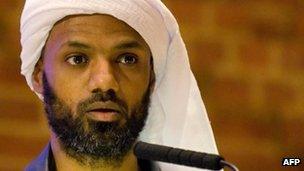UK government wins Uganda rendition allegations case
- Published
The government has fought off a case which could have revealed if British security officers were involved in alleged renditions in East Africa.
Three terror suspects say they are being held illegally in Uganda and information in the UK may prove that.
The men asked senior judges to force the government to disclose what British agencies know about their treatment.
The High Court rejected the challenge but didn't say whether British officers had been involved in the case.
The decision by the High Court is a boost for the government's attempts to protect its policy of neither confirming nor denying the activities of British security officials abroad.
The ruling also unusually involved the court going into a special secret session to debate national security evidence - a procedure ministers controversially want to expand.
In July 2010, bombs in Kampala killed 76 people watching a World Cup football match. The attacks were blamed on al-Shabaab, the armed Islamist group in Somalia.
Both Scotland Yard and MI5 have been investigating Islamist terrorism in East Africa and the threat posed by recruits from the UK.
The three men at the centre of the case, Omar Awadh Omar, Habib Sulieman Njoroge and Yahya Suleiman Mbuthia, were all arrested as part of the investigation into the bombings. They say they were illegally taken from Kenya to Uganda and have been brutally treated in detention. They could face the death penalty if convicted.
A British connection?
Lawyers for Mr Omar and Mr Njoroge say that they were separately interrogated by people they believed to be British - and that those people must have known how they were being treated.

Binyam Mohamed: Legal battle to force disclosure prompted Justice and Security Bill
The trio's lawyers told the High Court in London that the UK should reveal what officials knew about the alleged mistreatment so they could use that information in their legal battle in Uganda.
In their judgement, external, Sir John Thomas, the President of the Queen's Bench Division, and Mr Justice Burnett, said that the claimants had an arguable case that they had been treated wrongly, but that they were not going to force the UK security services to reveal what, if anything, they knew.
The judges said the UK was entitled to maintain its position of "neither confirming nor denying" secret activities relating to national security and that the men had not met a legal test which would compel the government to reveal anything.
Lawyers for the men had told the court that the Ugandan authorities had confirmed that foreign agencies were involved in the Kampala attacks.
During the case, the court went into a secret session to consider whether British officials were in fact mixed up in the case. The judge's conclusions will not be made public.
But in their open judgement, the judges said: "Despite the gravity of the alleged wrongdoing and the fact that the claimants are at risk of the death penalty, we should exercise our discretion and refuse relief."
The case was a major attempt to force the government to reveal details of secret counter-terrorism activities abroad and whether intelligence officers had complied with revised guidance designed to prevent them becoming complicit in the torture of suspects, external.
The different outcome two years ago of a very similar case, involving a former Guantanamo Bay detainee Binyam Mohamed, is a key reason for the government's Justice and Security Bill, external, currently before Parliament.
The bill would lead to more closed hearings to protect sensitive information on the grounds that its release would be damaging to national security.
The legislation includes a measure to restrict how and when judges can order the release of information where it is claimed that British officials are mixed up in wrongdoing.
Ministers say the restrictions on open courts are necessary to protect the workings of MI5 and MI6 and their relationships with foreign agencies. Critics say the plans demolish basic principles of justice and will prevent wrongdoing from coming to light.
- Published12 July 2010
